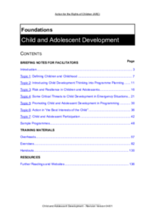Children and adolescents are not short adults - they are qualitatively different. They have physical, psychological and social needs that must be met to enable healthy growth and development. The extent to which parents, the family, the community and the society are able to meet these developmental needs (or not) has long-term consequences for the kinds of adults they will become. Armed conflict, displacement, disruption of normal life, and separation from family and/or community can have powerful, long-lasting effects that need to be compensated for in protection and assistance interventions. The fact that almost half of the people of concern to UNHCR are children and adolescents, gives quantitative significance to these operational issues.
Children and adolescents are not a homogenous group. While they share basic universal needs, the expression of those needs depends on a wide range of personal, social and cultural factors. The protection and assistance interventions of UNHCR and its partners are less likely to achieve their intended impact if a population of concern is treated as an undifferentiated group. An understanding is necessary, in a given situation, of what differences among gender, age, maturity, social class or caste, cultural or religious background have operational implications. Taking these factors into account is basic to good programming.
Children need the care, protection and guidance which is normally provided by parents or other care-givers, especially during the early years when they are most dependent. While their emerging abilities and capacities change the nature of this vulnerability from infancy through adolescence, their need for attention and guidance at each stage remains. Parents and communities have the primary responsibility for protecting and caring for their children, and initiating them into culturally relevant skills, attitudes and ways of thinking. Interventions by outsiders are significant largely to the extent that they strengthen (or inadvertently undermine) family and community capacities to provide this care and protection. There are some circumstances where the urgent needs of children or adolescents must be met directly, but maintaining a long-term view is essential to finding ways to enable families and communities to care for and protect their children on an ongoing basis.
This Resource Pack provides an introduction to some aspects of child development to inform and complement the material contained within the ARC Critical Issues Resource Packs. This resource pack does not aim to offer a comprehensive account of child and adolescent development: rather it seeks to provide some introductory material which relates particularly to some of the critical issues facing children with a refugee background. It is mainly knowledge based: facilitators will find many references to other ARC Resource Packs and may find it helpful to turn to these both to amplify some of the issues and to find more skill-oriented training materials.
©Action for the Rights of Children

